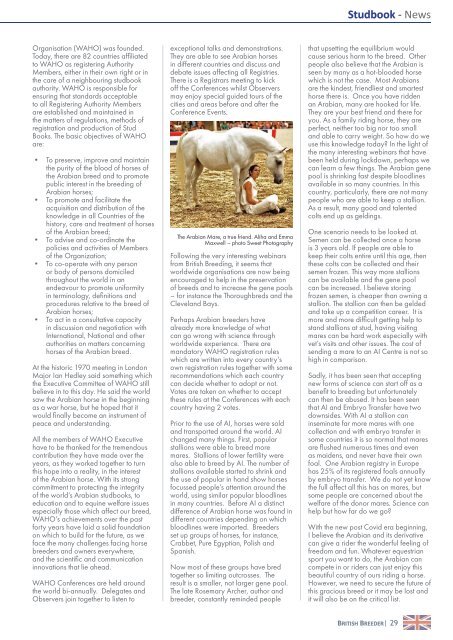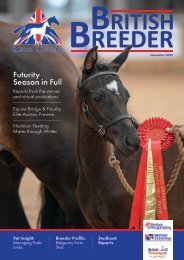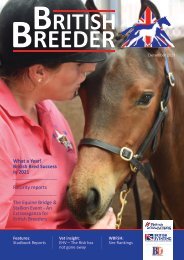British Breeder Magazine May 2021
Create successful ePaper yourself
Turn your PDF publications into a flip-book with our unique Google optimized e-Paper software.
Studbook - News<br />
Organisation (WAHO) was founded.<br />
Today, there are 82 countries affiliated<br />
to WAHO as registering Authority<br />
Members, either in their own right or in<br />
the care of a neighbouring studbook<br />
authority. WAHO is responsible for<br />
ensuring that standards acceptable<br />
to all Registering Authority Members<br />
are established and maintained in<br />
the matters of regulations, methods of<br />
registration and production of Stud<br />
Books. The basic objectives of WAHO<br />
are:<br />
• To preserve, improve and maintain<br />
the purity of the blood of horses of<br />
the Arabian breed and to promote<br />
public interest in the breeding of<br />
Arabian horses;<br />
• To promote and facilitate the<br />
acquisition and distribution of the<br />
knowledge in all Countries of the<br />
history, care and treatment of horses<br />
of the Arabian breed;<br />
• To advise and co-ordinate the<br />
policies and activities of Members<br />
of the Organization;<br />
• To co-operate with any person<br />
or body of persons domiciled<br />
throughout the world in an<br />
endeavour to promote uniformity<br />
in terminology, definitions and<br />
procedures relative to the breed of<br />
Arabian horses;<br />
• To act in a consultative capacity<br />
in discussion and negotiation with<br />
International, National and other<br />
authorities on matters concerning<br />
horses of the Arabian breed.<br />
At the historic 1970 meeting in London<br />
Major Ian Hedley said something which<br />
the Executive Committee of WAHO still<br />
believe in to this day. He said the world<br />
saw the Arabian horse in the beginning<br />
as a war horse, but he hoped that it<br />
would finally become an instrument of<br />
peace and understanding.<br />
All the members of WAHO Executive<br />
have to be thanked for the tremendous<br />
contribution they have made over the<br />
years, as they worked together to turn<br />
this hope into a reality, in the interest<br />
of the Arabian horse. With its strong<br />
commitment to protecting the integrity<br />
of the world’s Arabian studbooks, to<br />
education and to equine welfare issues<br />
especially those which affect our breed,<br />
WAHO’s achievements over the past<br />
forty years have laid a solid foundation<br />
on which to build for the future, as we<br />
face the many challenges facing horse<br />
breeders and owners everywhere,<br />
and the scientific and communication<br />
innovations that lie ahead.<br />
WAHO Conferences are held around<br />
the world bi-annually. Delegates and<br />
Observers join together to listen to<br />
exceptional talks and demonstrations.<br />
They are able to see Arabian horses<br />
in different countries and discuss and<br />
debate issues affecting all Registries.<br />
There is a Registrars meeting to kick<br />
off the Conferences whilst Observers<br />
may enjoy special guided tours of the<br />
cities and areas before and after the<br />
Conference Events.<br />
The Arabian Mare, a true friend. Aliha and Emma<br />
Maxwell – photo Sweet Photography<br />
Following the very interesting webinars<br />
from <strong>British</strong> Breeding, it seems that<br />
worldwide organisations are now being<br />
encouraged to help in the preservation<br />
of breeds and to increase the gene pools<br />
– for instance the Thoroughbreds and the<br />
Cleveland Bays.<br />
Perhaps Arabian breeders have<br />
already more knowledge of what<br />
can go wrong with science through<br />
worldwide experience. There are<br />
mandatory WAHO registration rules<br />
which are written into every country’s<br />
own registration rules together with some<br />
recommendations which each country<br />
can decide whether to adopt or not.<br />
Votes are taken on whether to accept<br />
these rules at the Conferences with each<br />
country having 2 votes.<br />
Prior to the use of AI, horses were sold<br />
and transported around the world. AI<br />
changed many things. First, popular<br />
stallions were able to breed more<br />
mares. Stallions of lower fertility were<br />
also able to breed by AI. The number of<br />
stallions available started to shrink and<br />
the use of popular in hand show horses<br />
focussed people’s attention around the<br />
world, using similar popular bloodlines<br />
in many countries. Before AI a distinct<br />
difference of Arabian horse was found in<br />
different countries depending on which<br />
bloodlines were imported. <strong>Breeder</strong>s<br />
set up groups of horses, for instance,<br />
Crabbet, Pure Egyptian, Polish and<br />
Spanish.<br />
Now most of these groups have bred<br />
together so limiting outcrosses. The<br />
result is a smaller, not larger gene pool.<br />
The late Rosemary Archer, author and<br />
breeder, constantly reminded people<br />
that upsetting the equilibrium would<br />
cause serious harm to the breed. Other<br />
people also believe that the Arabian is<br />
seen by many as a hot-blooded horse<br />
which is not the case. Most Arabians<br />
are the kindest, friendliest and smartest<br />
horse there is. Once you have ridden<br />
an Arabian, many are hooked for life.<br />
They are your best friend and there for<br />
you. As a family riding horse, they are<br />
perfect, neither too big nor too small<br />
and able to carry weight. So how do we<br />
use this knowledge today? In the light of<br />
the many interesting webinars that have<br />
been held during lockdown, perhaps we<br />
can learn a few things. The Arabian gene<br />
pool is shrinking fast despite bloodlines<br />
available in so many countries. In this<br />
country, particularly, there are not many<br />
people who are able to keep a stallion.<br />
As a result, many good and talented<br />
colts end up as geldings.<br />
One scenario needs to be looked at.<br />
Semen can be collected once a horse<br />
is 3 years old. If people are able to<br />
keep their colts entire until this age, then<br />
these colts can be collected and their<br />
semen frozen. This way more stallions<br />
can be available and the gene pool<br />
can be increased. I believe storing<br />
frozen semen, is cheaper than owning a<br />
stallion. The stallion can then be gelded<br />
and take up a competition career. It is<br />
more and more difficult getting help to<br />
stand stallions at stud, having visiting<br />
mares can be hard work especially with<br />
vet’s visits and other issues. The cost of<br />
sending a mare to an AI Centre is not so<br />
high in comparison.<br />
Sadly, it has been seen that accepting<br />
new forms of science can start off as a<br />
benefit to breeding but unfortunately<br />
can then be abused. It has been seen<br />
that AI and Embryo Transfer have two<br />
downsides. With AI a stallion can<br />
inseminate far more mares with one<br />
collection and with embryo transfer in<br />
some countries it is so normal that mares<br />
are flushed numerous times and even<br />
as maidens, and never have their own<br />
foal. One Arabian registry in Europe<br />
has 25% of its registered foals annually<br />
by embryo transfer. We do not yet know<br />
the full affect all this has on mares, but<br />
some people are concerned about the<br />
welfare of the donor mares. Science can<br />
help but how far do we go?<br />
With the new post Covid era beginning,<br />
I believe the Arabian and its derivative<br />
can give a rider the wonderful feeling of<br />
freedom and fun. Whatever equestrian<br />
sport you want to do, the Arabian can<br />
compete in or riders can just enjoy this<br />
beautiful country of ours riding a horse.<br />
However, we need to secure the future of<br />
this gracious breed or it may be lost and<br />
it will also be on the critical list.<br />
BRITISH BREEDER| 29















